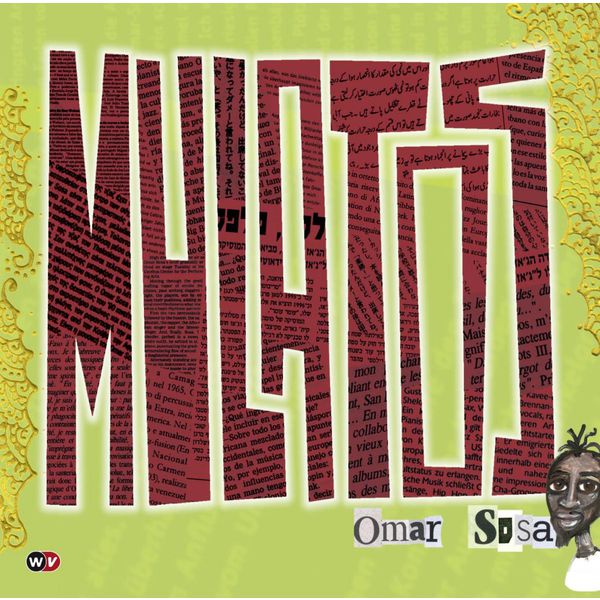
Unlimited Streaming
Listen to this album in high quality now on our apps
Start my trial period and start listening to this albumEnjoy this album on Qobuz apps with your subscription
SubscribeEnjoy this album on Qobuz apps with your subscription
Digital Download
Purchase and download this album in a wide variety of formats depending on your needs.
In various interviews, salsa/Latin jazz master Ray Barretto has complained about hard bop artists who employ Afro-Cuban rhythms in a very obvious way -- artists who will take a familiar Thelonious Monk, Clifford Brown, or Bud Powell standard and "Latinize" it by adding a son, cha cha, mambo, danzon, or guaguancó groove. There is nothing wrong with that approach (which can be quite enjoyable), but there is also something to be said for using Afro-Cuban/salsa elements in a less obvious fashion -- which is what Omar Sosa does on Mulatos. This post-bop release doesn't beat listeners over the head with Afro-Cuban rhythms, but they're present nonetheless. They enrich Sosa's material in their own subtle way, and the Cuban pianist/keyboardist (who employs Paquito D'Rivera as a clarinetist on three selections) demonstrates that Afro-Cuban jazz doesn't have to be something as overt as playing Monk's "Well, You Needn't" as a descarga (Latin jam) or approaching George Gershwin's "I Can't Get Started" as a bolero (Latin ballad). Afro-Cuban music isn't the only type of world music that inspires Sosa on Mulatos, which was recorded in Paris in early 2004; Sosa also brings elements of Middle Eastern, North African, and Indian music to his post-bop. Dhafer Youssef (one of the sidemen) is featured on the oud, a traditional Arabic lute that is quite legendary in Middle Eastern music -- and Philippe Foch, another participant, appears on Indian tabla drums. Of course, the oud and the tablas aren't exactly prominent instruments in Afro-Cuban jazz or salsa, but they're major assets on Mulatos -- an album that paints a consistently attractive picture of Sosa's multicultural outlook. Mulatos is yet another broad-minded project that Sosa can be proud to have in his catalog.
© Alex Henderson /TiVo
You are currently listening to samples.
Listen to over 100 million songs with an unlimited streaming plan.
Listen to this playlist and more than 100 million songs with our unlimited streaming plans.
From €13,50/month

Album review
In various interviews, salsa/Latin jazz master Ray Barretto has complained about hard bop artists who employ Afro-Cuban rhythms in a very obvious way -- artists who will take a familiar Thelonious Monk, Clifford Brown, or Bud Powell standard and "Latinize" it by adding a son, cha cha, mambo, danzon, or guaguancó groove. There is nothing wrong with that approach (which can be quite enjoyable), but there is also something to be said for using Afro-Cuban/salsa elements in a less obvious fashion -- which is what Omar Sosa does on Mulatos. This post-bop release doesn't beat listeners over the head with Afro-Cuban rhythms, but they're present nonetheless. They enrich Sosa's material in their own subtle way, and the Cuban pianist/keyboardist (who employs Paquito D'Rivera as a clarinetist on three selections) demonstrates that Afro-Cuban jazz doesn't have to be something as overt as playing Monk's "Well, You Needn't" as a descarga (Latin jam) or approaching George Gershwin's "I Can't Get Started" as a bolero (Latin ballad). Afro-Cuban music isn't the only type of world music that inspires Sosa on Mulatos, which was recorded in Paris in early 2004; Sosa also brings elements of Middle Eastern, North African, and Indian music to his post-bop. Dhafer Youssef (one of the sidemen) is featured on the oud, a traditional Arabic lute that is quite legendary in Middle Eastern music -- and Philippe Foch, another participant, appears on Indian tabla drums. Of course, the oud and the tablas aren't exactly prominent instruments in Afro-Cuban jazz or salsa, but they're major assets on Mulatos -- an album that paints a consistently attractive picture of Sosa's multicultural outlook. Mulatos is yet another broad-minded project that Sosa can be proud to have in his catalog.
© Alex Henderson /TiVo
About the album
- 1 disc(s) - 9 track(s)
- Total length: 00:55:28
- Main artist: Omar Sosa
- Label: world village
- Area: Cuba
- Genre: Jazz Latin Jazz
 Why buy on Qobuz...
Why buy on Qobuz...
-
Stream or download your music
Buy an album or an individual track. Or listen to our entire catalogue with our high-quality unlimited streaming subscriptions.
-
Zero DRM
The downloaded files belong to you, without any usage limit. You can download them as many times as you like.
-
Choose the format best suited for you
Download your purchases in a wide variety of formats (FLAC, ALAC, WAV, AIFF...) depending on your needs.
-
Listen to your purchases on our apps
Download the Qobuz apps for smartphones, tablets and computers, and listen to your purchases wherever you go.



